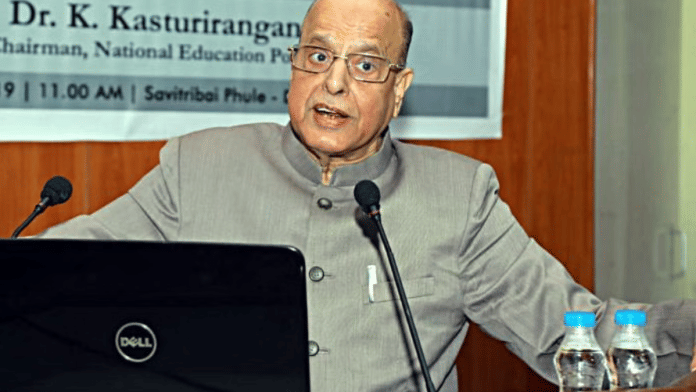New Delhi: Former Indian Space Research Organisation (ISRO) chairperson Krishnaswamy Kasturirangan, known as the father of the Polar Satellite Launch Vehicle (PSLV) in India’s space circuit, died Friday. He was 84.
Kasturirangan, who also served as secretary of the Department of Space, was the pioneer of India’s remote sensing satellites and played a pivotal role in propelling India to the front and centre of the highly competitive emerging space race.
He passed away at 10.43 am at his home in Bengaluru after a prolonged illness. In a statement, the family said Kasturirangan’s body will be kept at Bengaluru’s Raman Research Institute (RRI) Sunday between 10 am and 12 pm for people to pay their last respects.
Kasturirangan survived a major heart attack in 2023 but his health condition progressively deteriorated since, people close to the scientist told ThePrint.
Prime Minister Narendra Modi in a post on X said Kasturirangan’s visionary leadership and selfless contribution to the nation will always be remembered. “He served ISRO with great diligence, steering India’s space programme to new heights, for which we also received global recognition,” Modi posted on social media platform ‘X’.
I am deeply saddened by the passing of Dr. K. Kasturirangan, a towering figure in India’s scientific and educational journey. His visionary leadership and selfless contribution to the nation will always be remembered.
He served ISRO with great diligence, steering India’s space… pic.twitter.com/GPdFKPU7b5
— Narendra Modi (@narendramodi) April 25, 2025
“To me, he was far more than a mentor—he was a guiding light, a wellspring of wisdom, compassion, and quiet strength. I consider myself truly fortunate to have received his affection, blessings, and guidance over the years,” Union Education Minister Dharmendra Pradhan posted on X.
I am deeply heartbroken by the passing of Padma Vibhushan Dr. K. Kasturirangan ji. His loss is not only a profound one for the global scientific and academic community, but an intensely personal one for me. To me, he was far more than a mentor — he was a guiding light, a… pic.twitter.com/QEHDZcguKz
— Dharmendra Pradhan (@dpradhanbjp) April 25, 2025
Also read: ‘Centre should refer to 2013 report’ — ex-ISRO chief on upcoming Western Ghats notification
Space pioneer
Best known for his illustrious career in shaping India’s space programme, Kasturirangan was chairperson of ISRO for nine years, between 1994 and 2003.
Before taking charge of the ISRO, he held various important positions, including as director of the ISRO Satellite Centre, where he oversaw activities related to the Indian National Satellite (INSAT-2), Indian Remote Sensing Satellites (IRS-1A and 1B), scientific satellites and new generation spacecraft.
He was also project director for India’s first two experimental earth observation satellites—BHASKARA-I and II—and spearheaded the country’s first operational Indian Remote Sensing Satellite, IRS-1A. Under his leadership, ISRO also launched and operationalised its most trusted workhorse rocket, the Polar Satellite Launch Vehicle (PSLV) and undertook the first successful flight testing of the Geosynchronous Satellite Launch Vehicle (GSLV).
These launch vehicles have the highest success records and continue to be used for significant mission launches.
Former ISRO chairperson, S. Somanath, told ThePrint the passing of Kasturirangan was a big loss to the scientific community, which gained immensely from his work and experience. “A lot of what the ISRO has achieved is because of his contributions.”
In 2013, a 10-member panel led by Kasturirangan recommended the notification of 37 percent of the 1.29 lakh square kilometres of Western Ghats as ecologically sensitive.
In an interview with ThePrint in August last year, he had urged the government to implement recommendations of the committee to ensure protection and conservation of the Western Ghats while considering the plight of residents in the area.
The brain behind NEP 2020
Dr. K. Kasturirangan was also the driving force behind India’s National Education Policy (NEP) 2020—a landmark policy that introduced sweeping changes across all levels of the country’s education system.
His leadership helped draft the policy encompassing a wide spectrum of educational reforms, including early childhood care and education, restructuring of school and higher education, examination reforms, and enhanced teacher training and professional development.
He also chaired a 12-member steering committee that developed the National Curriculum Framework (NCF), which now serves as the foundation for new school textbooks currently being rolled out across the country.
His colleagues from the NEP steering committee fondly remember him as a democratic and visionary leader who deeply valued collective input.
“He always thought ahead of his time while drafting the policy,” said NEP committee member and academician M.K. Sridhar in an interview with ThePrint. “His approach wasn’t to merely solve today’s problems, but to envision the future of education in India.”
Sridhar remembered Kasturirangan’s inclusive and open-minded approach while drafting the policy. “He took inputs for NEP 2020 from a wide range of voices—even school students. He gave equal importance to everyone’s views and never dismissed anyone’s. Throughout the process, he listened carefully and encouraged all of us to share our opinions freely,” he said.
Early education and work
Kasturirangan had a Bachelors degree in Science with Honours from the Ramnarain Ruia College in Mumbai, and a Masters degree in Physics from what was then called Bombay University (now University of Mumbai).
He then received his Doctorate in experimental high-energy astronomy in 1971 from the university, and extensively worked in the Physical Research Laboratory in Ahmedabad during his early career.
In past conversations with ThePrint, Kasturirangan spoke extensively about his love for astrophysics, particularly in the areas of high-energy X-ray and gamma-ray astronomy and optical astronomy.
A recipient of Padma Vibhushan, Padma Bhushan and Padma Shri for his contributions in the field of science, Kasturirangan had a long list of awards to his name, including the Shanti Swarup Bhatnagar Award, Dr Vikram Sarabhai Prerit Award in Aerospace, MP Birla Memorial Award in Astronomy, Shri MM Chugani Memorial Award in Applied Science, H.K. Firodia Award in Science Technology, among others.
Edited by Ajeet Tiwari)
Also Read: Sriharikota, we have a situation. Limited budget, manpower are stifling India’s space ambitions






